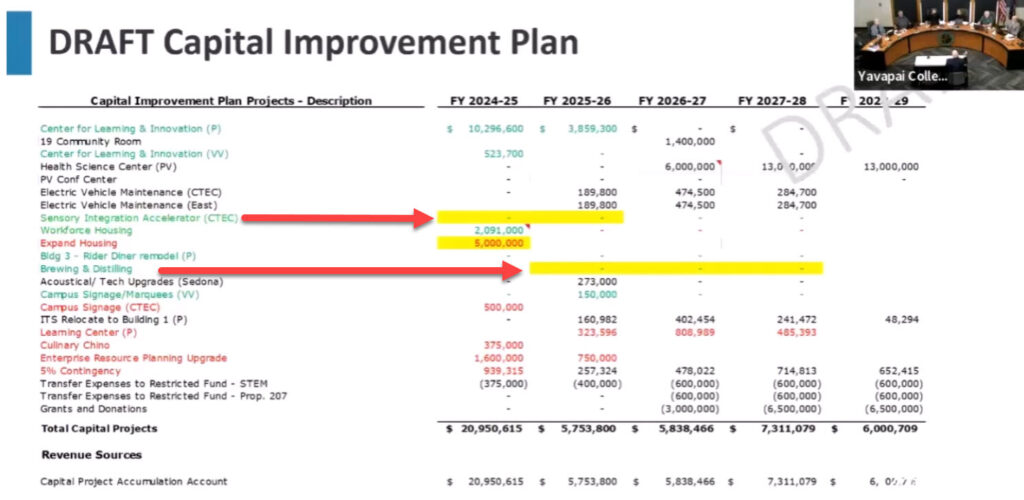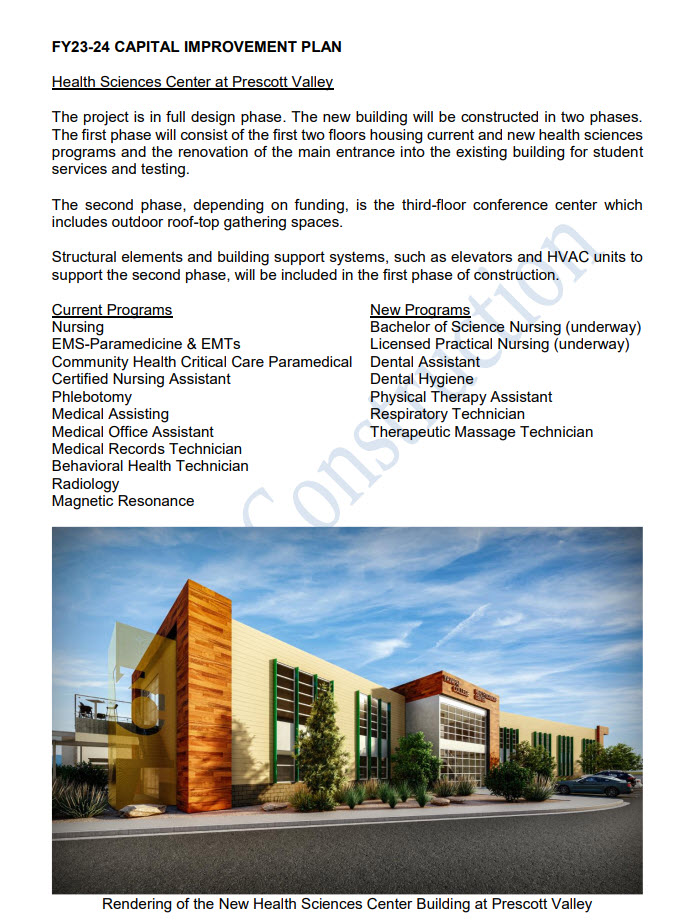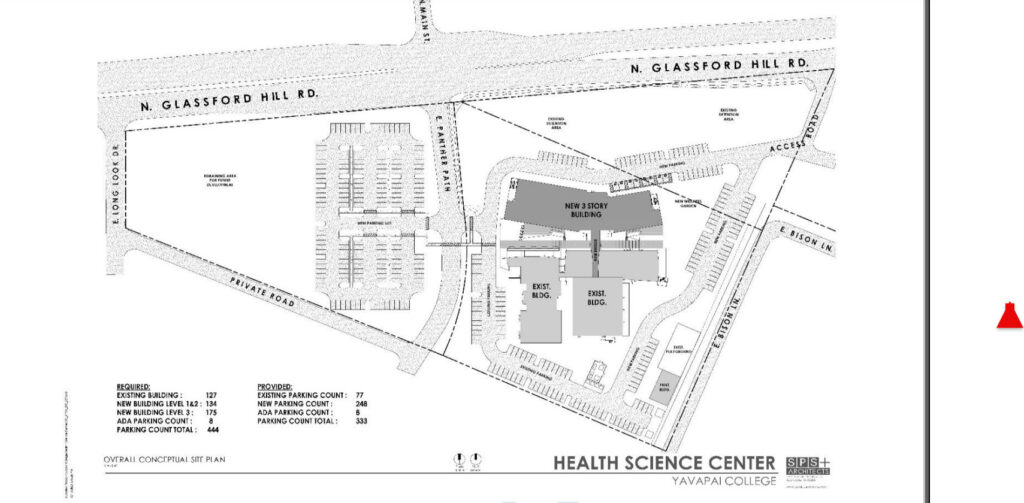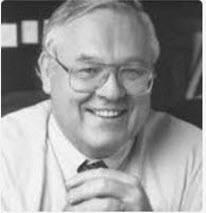Yavapai Community College says it is following advice from unnamed secret advisory committee in not seriously exploring starting EV program in addition to cost, need for expensive equipment, and proprietary rules
Yavapai Community College has invested over half a million dollars, possibly more, in developing a curriculum for a highly speculative 3D home concrete printing project, purportedly to position itself at the forefront of this innovation. However, on the flip side, the institution appears to have long resisted initiating training programs for electric vehicle (EV) technicians, EV charging installers, and EV charging maintenance technicians, especially on the east side of Mingus. This reluctance is reportedly driven by an unnamed secret Career and Technical Education Committee advising Dean John Morgan against such initiatives, cost, and a need for specialized equipment.
Speculation suggests that Yavapai’s hesitation to explore EV training programs may also be influenced by its close ties and current teaching program associated with Freeport-McMoRan, a company relying heavily on well-trained diesel mechanics to operate and maintain its diesel equipment, particularly at its mining operations in Bagdad, Arizona, situated in Yavapai County. Historically, Freeport-McMoRan has provided financial support to the College’s Career and Technical Education Center at the Prescott airport.
According to a press release from Maricopa Gateway Community College, a report from the Alternative Fuels Data Center of the U.S. Department of Energy highlights Arizona’s emergence as a dominant force in EV and battery manufacturing, ranking seventh in the U.S. for the number of registered electric vehicles. Notable industry players such as Tesla, Lucid Motors, Nikola, Li-Cycle, and ElectraMeccanica have collectively invested over $58 billion in private funds since 2021, cementing the state’s position as a key player in the EV and battery sectors for years to come.
To hear Dean Morgan’s statement to the District Governing Board on February 20, 2024, CLICK HERE. The video discusses the challenges of maintaining and training technicians for electronic vehicles due to the proprietary rules of car manufacturers, with a $300,000 cost for a single class and the need for specialized tools and equipment.
To hear a similar statement made to the District Governing Board by Dean Morgan on November 15, 2022, please CLICK HERE.
PRESS RELEASE FROM GATEWAY COLLEGE:
By GateWay Community College
Jan 17, 2024
In a transformative moment for Phoenix, GateWay Community College (GWCC) is poised to lead the charge into the future with its revolutionary Electric Vehicle (EV) program. In collaboration with Legacy EV, a market leader in aftermarket EV applications, the program positions GateWay as a leader in EV education. Legacy EV’s expertise in electric vehicle technology and commitment to fostering innovation makes them an ideal collaborator for this groundbreaking venture.
“I am proud of GateWay and Legacy EV’s commitment to innovation through the Electric Vehicle program. Together, we are educating students and developing the talent that will drive the electric automobile revolution,” said Amy Diaz, Ed.D., president, GateWay Community College.
Arizona’s EV dominance
According to the Alternative Fuels Data Center of the U.S. Department of Energy, Arizona has emerged as a dominant force in EV and battery manufacturing, ranking seventh in the U.S. for number of registered electric vehicles. Significant players like Tesla, Lucid Motors, Nikola, Li-Cycle and ElectraMeccanica have invested over $58 billion in private funds since 2021, solidifying the state’s status as a top player in the EV and battery industries for years to come.
Economic impact and employment opportunities
GateWay’s EV program is a forward-thinking effort crucial to meeting the rising demand for skilled EV technicians. As part of Arizona’s dynamic EV manufacturing ecosystem, the program aligns seamlessly with Phoenix’s commitment to transportation electrification and a sustainable future. Karen Apple, electric vehicles program manager with the city of Phoenix, emphasizes the significance of qualified EV technicians in achieving Phoenix’s EV goals.
“The city of Phoenix is excited about GateWay’s program and partnership with Legacy EV. Qualified EV technicians are needed to support the city’s goal of having 280,000 EVs on the roads of Phoenix by 2030,” said Apple.
Nurturing skilled professionals
GWCC and Legacy EV are at the forefront of cultivating a new generation of skilled professionals prepared for the challenges and opportunities in the EV industry. The transformative EV program empowers individuals to navigate EV systems intricately, from diagnostics to repairs, ensuring preparedness for the evolving automotive landscape.
Catalyst for change and economic growth
The economic impact of GateWay’s Electric Vehicle program aligns with the surging growth in the EV market. The program catalyzes change, symbolizing GWCC’s dedication to sustainability and offering opportunities for those aspiring to be at the forefront of the EV revolution.
“Over three years ago, we saw the growing demand for properly trained EV technicians was not being met,” said Mavrick Knoles, president and co-founder of Legacy EV. “The realization that the automotive repair market was not preparing for the EV transition led us to pioneer one of the nation’s first education programs for the next generation of auto technicians. We assembled a team of some of Arizona’s top educators who understand the importance of quality content that gives students the skills necessary to succeed in the changing auto industry. Within just a few short years, our training program has been implemented across the country, as well as Canada. Based in Tempe, Arizona, it was clear that leveraging our education program with GateWay Community College was a perfect partnership to make the Phoenix area a national hub for EV workforce development.”
Anticipated program launch: Late 2024/early 2025
As Phoenix advances its plans for transportation electrification, GateWay’s Electric Vehicle program stands as an exemplar, illustrating how education can shape a sustainable and prosperous future. The collaboration with Legacy EV underscores a commitment to excellence, ensuring that GateWay’s graduates become pioneers in the swiftly evolving landscape of EV technology. Eager anticipation surrounds the unfolding program for its positive impact on the community and the broader EV industry within the economic region.
For further information on GateWay Community College’s Electric Vehicle program launch, expected between late 2024 and early 2025, please visit gatewaycc.edu.
The Maricopa County Community College District includes 10 individually-accredited colleges – Chandler-Gilbert, Estrella Mountain, GateWay, Glendale, Mesa, Paradise Valley, Phoenix, Rio Salado, Scottsdale and South Mountain – and the Maricopa Corporate College, serving approximately 140,000 students with bachelor’s degrees, two-year degrees, certificates, and university transfer programs.
 The Yavapai Community College District Governing Board was informed during its February 20 meeting that the College, in collaboration with the Mountain Institute Career and Technical Education District, is planning to establish a culinary training facility at the College’s Chino Valley Center. This initiative stems from the success of the training program already in place at Prescott High School under the auspices of the Mountain Institute.
The Yavapai Community College District Governing Board was informed during its February 20 meeting that the College, in collaboration with the Mountain Institute Career and Technical Education District, is planning to establish a culinary training facility at the College’s Chino Valley Center. This initiative stems from the success of the training program already in place at Prescott High School under the auspices of the Mountain Institute.
 The $10 to $12 million, 14,000 square foot commercial lab facility intended to provide Sedona/Verde Valley students with brewing and distilling beer training was formally approved and included in the College budget by the Yavapai Community College District Governing Board in May 2022. Almost two years later, on February 20, 2024, at the Community College District Governing Board meeting, it was pronounced essentially dead as a project and removed from future consideration. It is anticipated that the final 2024-25 budget will be approved without the project or any replacement at the Board’s May meeting.
The $10 to $12 million, 14,000 square foot commercial lab facility intended to provide Sedona/Verde Valley students with brewing and distilling beer training was formally approved and included in the College budget by the Yavapai Community College District Governing Board in May 2022. Almost two years later, on February 20, 2024, at the Community College District Governing Board meeting, it was pronounced essentially dead as a project and removed from future consideration. It is anticipated that the final 2024-25 budget will be approved without the project or any replacement at the Board’s May meeting. Yavapai Community College began live-streaming District Governing Board meetings on the College’s YouTube channel on February 20. This decision was made without any prior notice in the posted February 20 agenda or elsewhere to the public. The positive aspect is that, along with live-streaming, the meeting was posted on YouTube on February 21 for those interested in viewing it.
Yavapai Community College began live-streaming District Governing Board meetings on the College’s YouTube channel on February 20. This decision was made without any prior notice in the posted February 20 agenda or elsewhere to the public. The positive aspect is that, along with live-streaming, the meeting was posted on YouTube on February 21 for those interested in viewing it. To repay the revenue bonds over an extended period, the Community College must take funds only from tuition and other income producing sources, excluding property taxes. However, to replenish the funds drawn from these sources, it may, and most likely will, necessitate an increase in the County property tax rate, a decision requiring only three votes from the five-member District Governing Board. The public cannot block the tax rate increase once a majority on the Board approves it.
To repay the revenue bonds over an extended period, the Community College must take funds only from tuition and other income producing sources, excluding property taxes. However, to replenish the funds drawn from these sources, it may, and most likely will, necessitate an increase in the County property tax rate, a decision requiring only three votes from the five-member District Governing Board. The public cannot block the tax rate increase once a majority on the Board approves it.


 The Yavapai Community College District Governing Board will hold what is described as a “Study Session” and “Business Meeting” at the Rock House on the Prescott Campus on Tuesday, February 20, 2024. The meeting is scheduled to begin at 1:00 p.m. and run until 4:00 p.m.
The Yavapai Community College District Governing Board will hold what is described as a “Study Session” and “Business Meeting” at the Rock House on the Prescott Campus on Tuesday, February 20, 2024. The meeting is scheduled to begin at 1:00 p.m. and run until 4:00 p.m. The Yavapai Community College convened yet another of its frequent secret (legal) executive meetings on Tuesday, February 13, to deliberate on acquiring additional property in Prescott. However, customary of such proceedings, the Community College has once again chosen to withhold any specifics regarding the purchase post-meeting.
The Yavapai Community College convened yet another of its frequent secret (legal) executive meetings on Tuesday, February 13, to deliberate on acquiring additional property in Prescott. However, customary of such proceedings, the Community College has once again chosen to withhold any specifics regarding the purchase post-meeting.